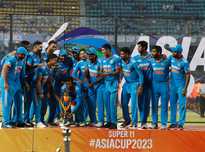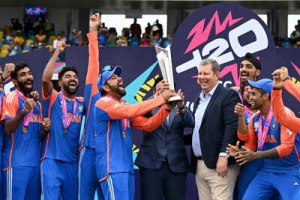The Asia Cup saga might be nearing a resolution. Although definitive conclusions remain premature, a palpable sense of optimism has emerged regarding the continental championship, a significant shift from the earlier uncertainty fueled by tensions between India and Pakistan.

While concrete details are pending, sources suggest a formal decision could materialize next week. The Asian Cricket Council (ACC) is reportedly aiming to release the schedule for the six-team tournament in the first week of July, coinciding with a planned meeting.
The ACC is reportedly targeting a launch in the second week of September, with September 10th being considered as a likely start date, should everything proceed as planned. The T20 format tournament will feature India, Pakistan, Afghanistan, Sri Lanka, Bangladesh, and the UAE. Promotional activities for the tournament have already commenced.
The UAE remains the leading contender to host the tournament. However, discussions are ongoing regarding a potential hybrid format. Due to existing agreements, when it is India or Pakistan's turn to host the Asia Cup, the event is held at a neutral venue.
The tournament's fate was initially clouded by the terror attack in Pahalgam in April, compounded by India's Operation Sindoor against Pakistan in May. Calls for boycotting Pakistan in multilateral events grew louder, given India's existing stance of not engaging in bilateral cricket with them. There was even speculation that a potential boycott by India would be discussed at the upcoming ICC meeting.
Recent developments in the global cricket landscape suggest a possible shift. The ICC recently unveiled schedules for the Women's ODI World Cup in India and Sri Lanka, as well as the Women's T20 World Cup in England. Notably, India and Pakistan are slated to clash in both tournaments, on October 5th in Colombo and June 14th at Edgbaston, respectively.
While official statements from the BCCI, ACC, or ICC are absent, these scheduled matches imply a continuation of cricketing ties between the two rivals, at least within the framework of global events. These encounters generate significant revenue for global cricket. While India and the BCCI might not be heavily reliant on this revenue, governing bodies like the ICC and ACC, along with their member boards, certainly are.
Newer articles
Older articles
 Rishabh Pant: Greg Chappell Hails India Star as Cricket Game-Changer
Rishabh Pant: Greg Chappell Hails India Star as Cricket Game-Changer
 Gavaskar Calls for Kuldeep Yadav Inclusion in Second Test Amid Bumrah Fitness Concerns, Cites Birmingham Pitch Advantage
Gavaskar Calls for Kuldeep Yadav Inclusion in Second Test Amid Bumrah Fitness Concerns, Cites Birmingham Pitch Advantage
 Bumrah's Birmingham Bowling Blitz: Accuracy, Angle Variation Headline Intense Net Session as Kuldeep Sharpens Skills
Bumrah's Birmingham Bowling Blitz: Accuracy, Angle Variation Headline Intense Net Session as Kuldeep Sharpens Skills
 Jaiswal Aims to Shatter Gavaskar's 49-Year Record in Edgbaston Test
Jaiswal Aims to Shatter Gavaskar's 49-Year Record in Edgbaston Test
 Bangladesh Test Captain Najmul Hossain Shanto Resigns After Sri Lanka Defeat
Bangladesh Test Captain Najmul Hossain Shanto Resigns After Sri Lanka Defeat
 Asia Cup 2025: ACC Aims for September Start as Optimism Surges Amid Geopolitical Shifts
Asia Cup 2025: ACC Aims for September Start as Optimism Surges Amid Geopolitical Shifts
 Pogba Resumes Career, Signs with AS Monaco After Doping Suspension
Pogba Resumes Career, Signs with AS Monaco After Doping Suspension
 Rohit Sharma Reflects on India's T20 World Cup Triumph, Hails Barbados as "Lucky Ground"
Rohit Sharma Reflects on India's T20 World Cup Triumph, Hails Barbados as "Lucky Ground"
 Edgbaston Test Preview: Experts Call for Kuldeep Yadav's Inclusion as India Seeks Series Leveler Against England
Edgbaston Test Preview: Experts Call for Kuldeep Yadav's Inclusion as India Seeks Series Leveler Against England
 Alcaraz Concedes to Wimbledon Nerves After Five-Set Opening Round Battle
Alcaraz Concedes to Wimbledon Nerves After Five-Set Opening Round Battle